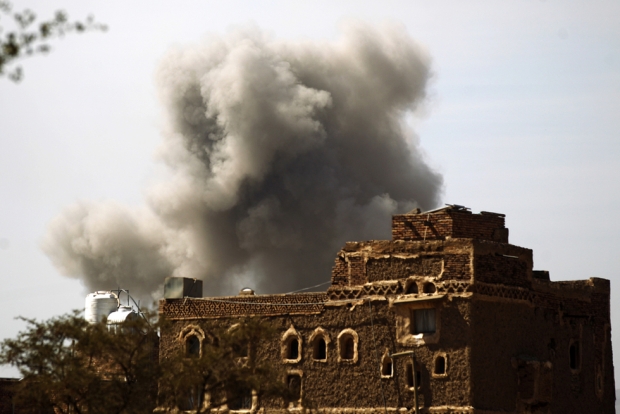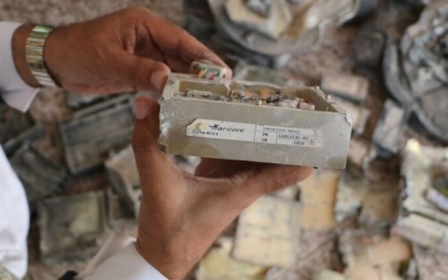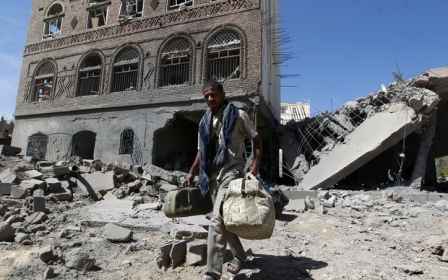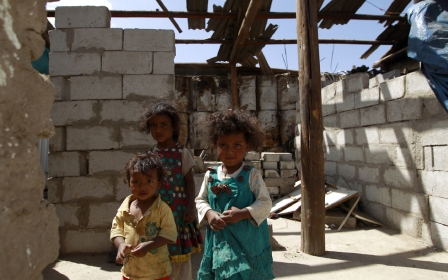UK campaign loses bid to block weapons sales to Saudi Arabia
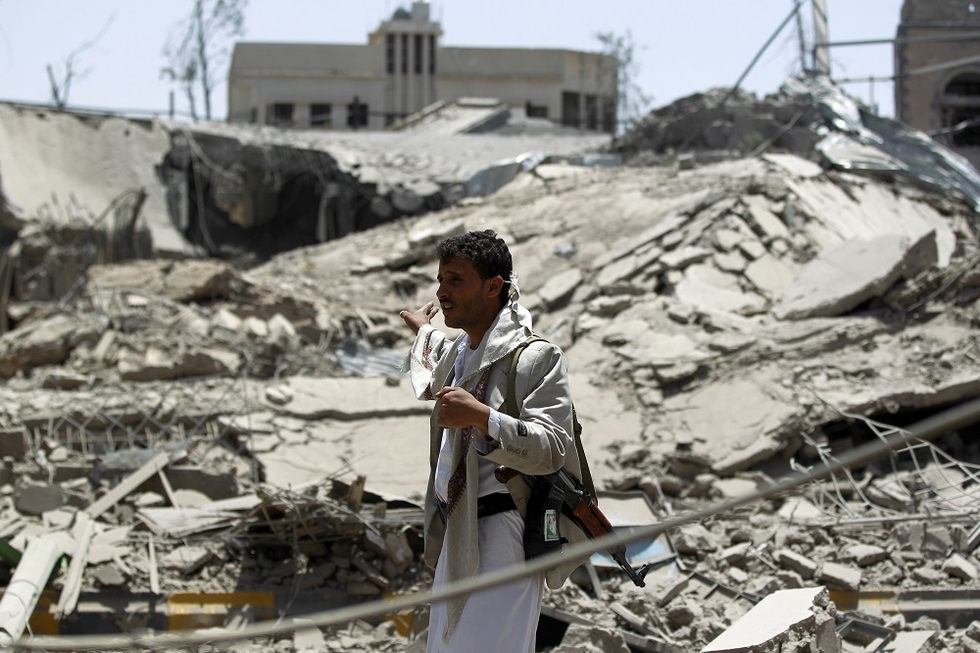
The UK will continue to export billions of pounds of weapons to Saudi Arabia after anti-arms trade campaigners lost a high-profile legal case in London on Monday.
The high court ruled on Monday morning that arms sales to the oil-rich Gulf kingdom can continue after lawyers acting for Campaign Against Arms Trade (CAAT) lost a landmark judicial review against the British government's arms trade policy. Campaigners say they will appeal the decision.
The UK has licensed more than $3.5bn of arms to Saudi Arabia in the last two years despite claims of "overwhelming evidence" that UK-made weapons are being used in violations of International Humanitarian law in Yemen, where Saudi Arabia has waged a bombing campaign since 2015.
Thousands of civilians have died in the civil war in Yemen, where Saudi Arabia and its Gulf allies have backed the ousted government against Houthi rebels supported by Iran.
For more than two years the UK government has ignored calls from CAAT and a coalition of NGOs, including Amnesty International and Save the Children, to stop "immoral and illegal arms sales" to Saudi Arabia.
Campaigners have said they will appeal the verdict, which they say came despite global concern over the use of these weapons against civilians. To the dismay of campaigners half the case took place in secret in "close sessions" over national security concerns, and the secret material provided "valuable additional support," the judges said.
Andrew Smith, spokesperson for CAAT, said: "This is a very disappointing verdict, and we are pursuing an appeal.
"If this verdict is upheld then it will be seen as a green light for government to continue arming and supporting brutal dictatorships and human rights abusers like Saudi Arabia that have shown a blatant disregard for international humanitarian law.
It will be seen as a green light for government to continue arming and supporting brutal dictatorships
- Andrew Smith, CAAT
But despite the prospect of a possible appeal, the court ruling will come as a relief to British ministers and officials who have said that engaging with the kingdom is the only way to improve its record.
Speaking in the high court on Monday, Lord Justice Burnett, who led the case with Mr Justice Haddon-Cave, said: "We have concluded that the material decisions of the secretary of state were lawful. We therefore dismiss the claim."
The court is also handing down a closed judgment detailing its verdict on the secret information that was not heard in public amid security concerns. But in a press statement released by the court on Monday the judges said: "This open-source material is only part of the picture."
The statement said the ministry of defence had access to materials such as coalition fast-jet operational reporting data, high-res imagery, and UK defence intelligence reports and battle-damage assessments.
"The open and closed evidence demonstrated that the secretary of state was rationally entitled to conclude" the Saudi-led coalition was not deliberately targeting civilians, was properly investigating allegations of civilian casualties, and was engaging with the British government about its concerns, the judges found.
Nonetheless, the case and court revelations that the foreign secretary, Boris Johnson, pressed fellow ministers to continue arms exports even after a funeral bombing killed more than 140 last October, have been embarrassing for the government given its close military and diplomatic ties to Riyadh.
During the case, which was launched in February, the court head that the UK government had ignored the advice of its own arms control experts and refused to suspend the sale of arms to Saudi Arabia. The revelation came after documents showed that a senior civil servant at the Export Control Organisation, the UK government body responsible for granting arms export licences, warned against continued exports.
CAAT also questioned whether the export licences were compatible with UK and EU legislation amid concerns over Saudi Arabia’s action in Yemen, which have been condemned as unlawful by a UN panel of experts, the European Parliament and humanitarian NGOs.
However, after seeing secret evidence, the high court rejected claims that the UK government was acting unlawfully by failing to suspend the sale of UK arms to Saudi Arabia.
To the dismay of rights campaigners, the legal verdict relied heavily on evidence presented during the secret part of the trial, where CAAT’s legal team was represented by a security-cleared special advocate.
Much of the reasoning behind the judges' decision is contained in a "closed judgment" document. However, this is not publicly available and can only be viewed by the government’s legal team and CAAT’s special advocate, who cannot reveal any of its contents to the NGO or the media.
Speaking of the secret material's role in the case, the judges said "closed material," which had not been made public for national security reasons, "provides valuable additional support for the conclusion that the decisions taken by the secretary of state not to suspend or cancel arms sales to Saudi Arabia were rational".
Major relief for government
The court victory for the government means that exports will be able to continue arms export to Saudi Arabia, in a move that will come as a major relief to officials in London.
A halt or even a pause in exports would have endangered a relationship seen as vital in London, where officials hope to sign a post-Brexit trade deal with Gulf states soon after the UK exits the European Union in 2019.
The UK’s close relationship with Saudi Arabia was repeatedly underscored in between the high court judges hearing the case in April and the release of Monday’s verdict. Theresa May travelled to Saudi Arabia in April where she announced the UK would help review the kingdom’s "defence capabilities," ignoring calls to end arms sales.
The following month arms manufacturer BAE Systems, a major exporter of weapons to Saudi Arabia, also refused to confirm or deny whether the firm’s staff in Saudi Arabia are loading bombs and missiles onto fighter jets involved in the bombardment of Yemen, to the dismay of CAAT activists.
Smith added: "This case has seen an increased scrutiny of the government’s toxic relationship with Saudi Arabia. It is a relationship that more than ever needs to be examined and exposed. For decades the UK has been complicit in the oppression of Saudi people, and now it is complicit in the destruction of Yemen."
In court government lawyers had argued that the UK had used its "considerable insight" into the actions of the Saudi Arabian military to make "considered analysis" over whether to continue arms exports to the kingdom, the court heard in February.
The high court ruling comes at a crucial time for UK-Saudi relations after it emerged that Prime Minister Theresa May is being accused of sitting on a report into the funding of terrorism in the UK that is believed to be critical of Saudi Arabia, the largest buyers of British-made arms.
A court victory for CAAT would have forced the UK to suspend exports of weapons intended for use in Yemen, and would likely have triggered a wider scrutiny of the export of UK-made weapons to other countries suspected of breaching international humanitarian law.
The legal action was brought by law firm Leigh Day on behalf of the CAAT against the Secretary of State for International Trade, the minister who oversees arms export licences.
The law is clear: where there is a clear risk UK arms might be used in the commission of serious violations of international law, arm sales cannot go ahead.
- Rosa Curling, lawyer
Rosa Curling, a spokeswoman for Leigh Day, said: "The law is clear: where there is a clear risk UK arms might be used in the commission of serious violations of international law, arm sales cannot go ahead.
"Nothing in the open evidence, presented by the UK government to the court, suggests this risk does not exist in relation to arms to Saudi Arabia. Indeed, all the evidence we have seen from Yemen suggests the opposite: the risk is very real."
Aid groups warned the judgment signalled a "potentially deadly setback to Yemeni civilians".
It comes after a leaked UN report, first reported on in January last year, highlighted "widespread and systematic" targeting of civilians in Saudi-led strikes, which it said included air attacks on hospitals and schools, as well as camps for refugees.
All parties in the conflict have been accused of serious violations, including possible war crimes. Amnesty International has said the Saudi Arabia-led coalition’s pattern of attacks across Yemen "raises serious concerns about an apparent disregard for civilian life".
New MEE newsletter: Jerusalem Dispatch
Sign up to get the latest insights and analysis on Israel-Palestine, alongside Turkey Unpacked and other MEE newsletters
Middle East Eye delivers independent and unrivalled coverage and analysis of the Middle East, North Africa and beyond. To learn more about republishing this content and the associated fees, please fill out this form. More about MEE can be found here.


